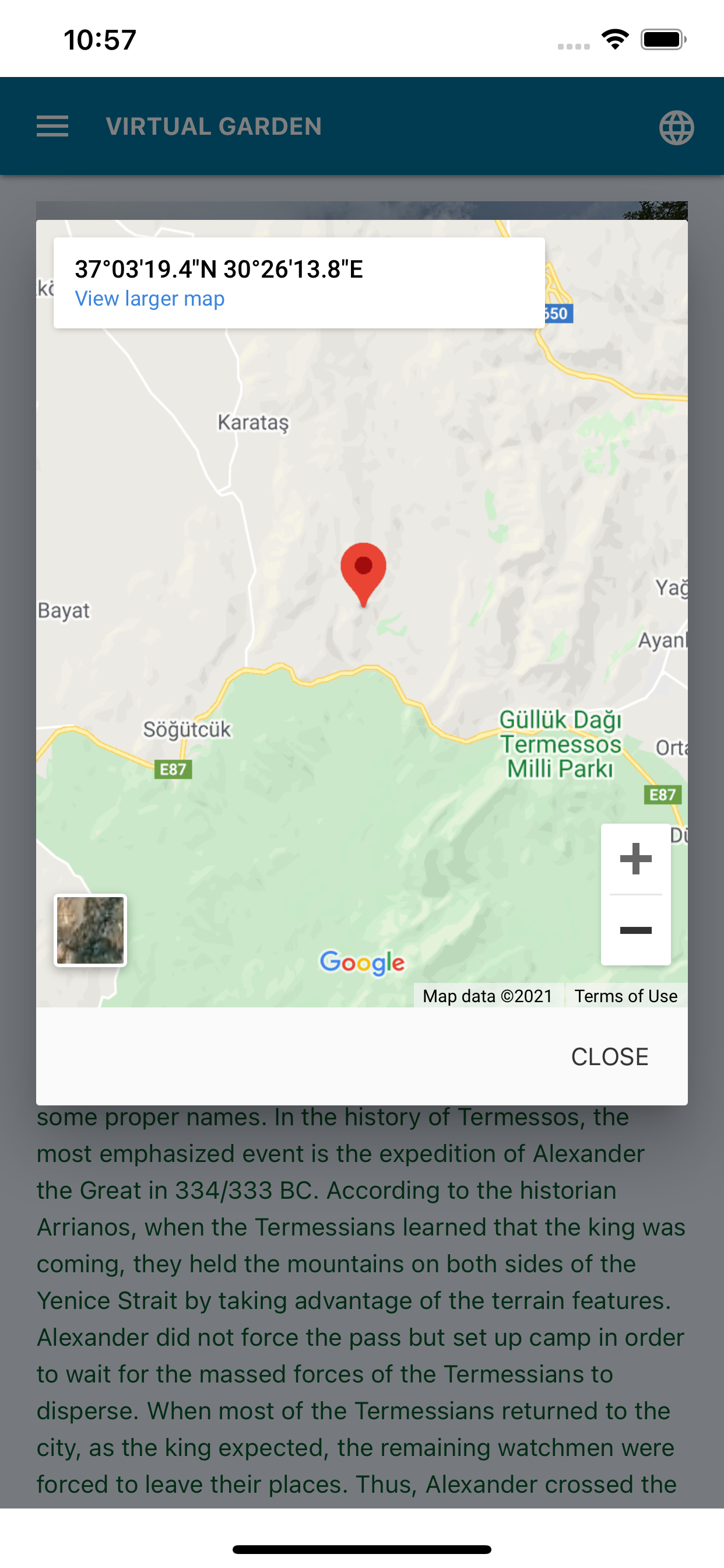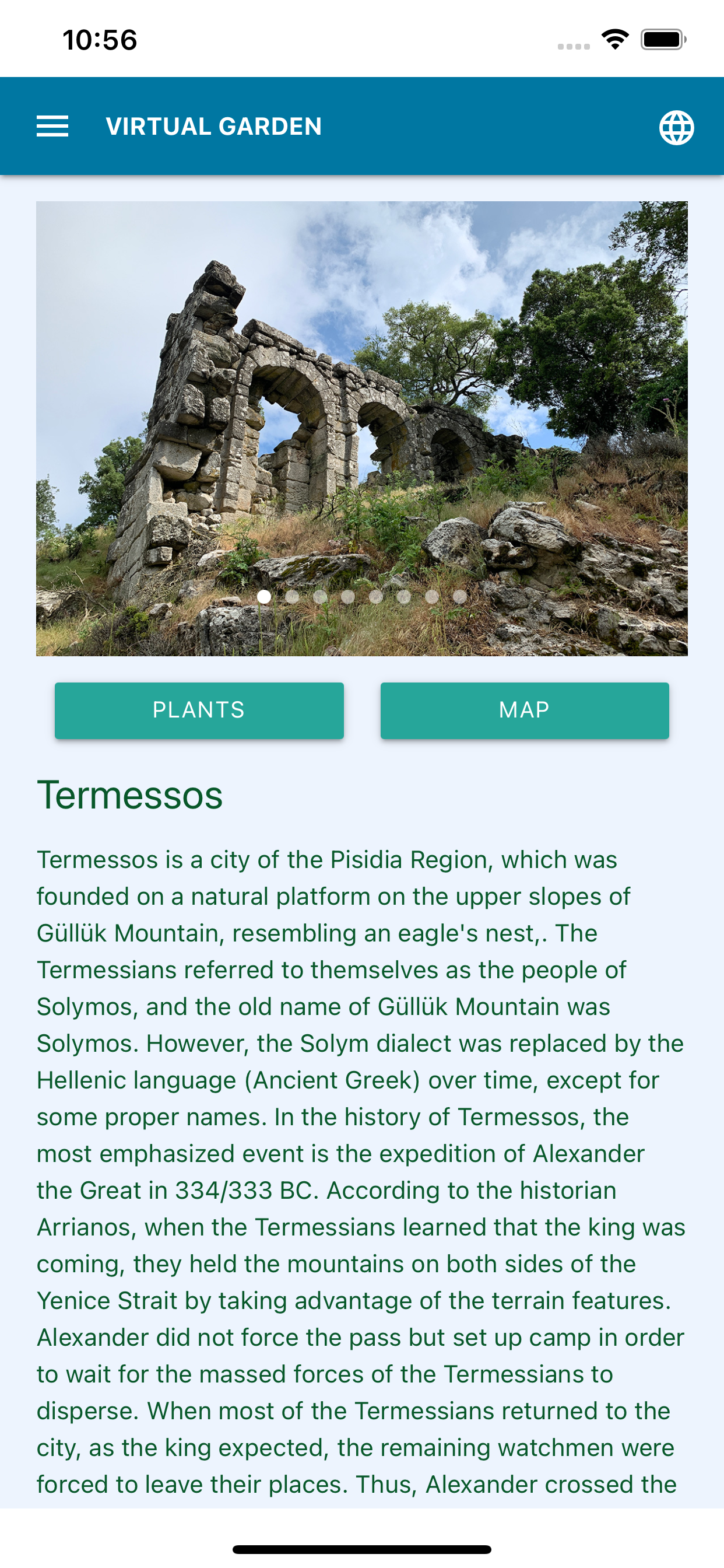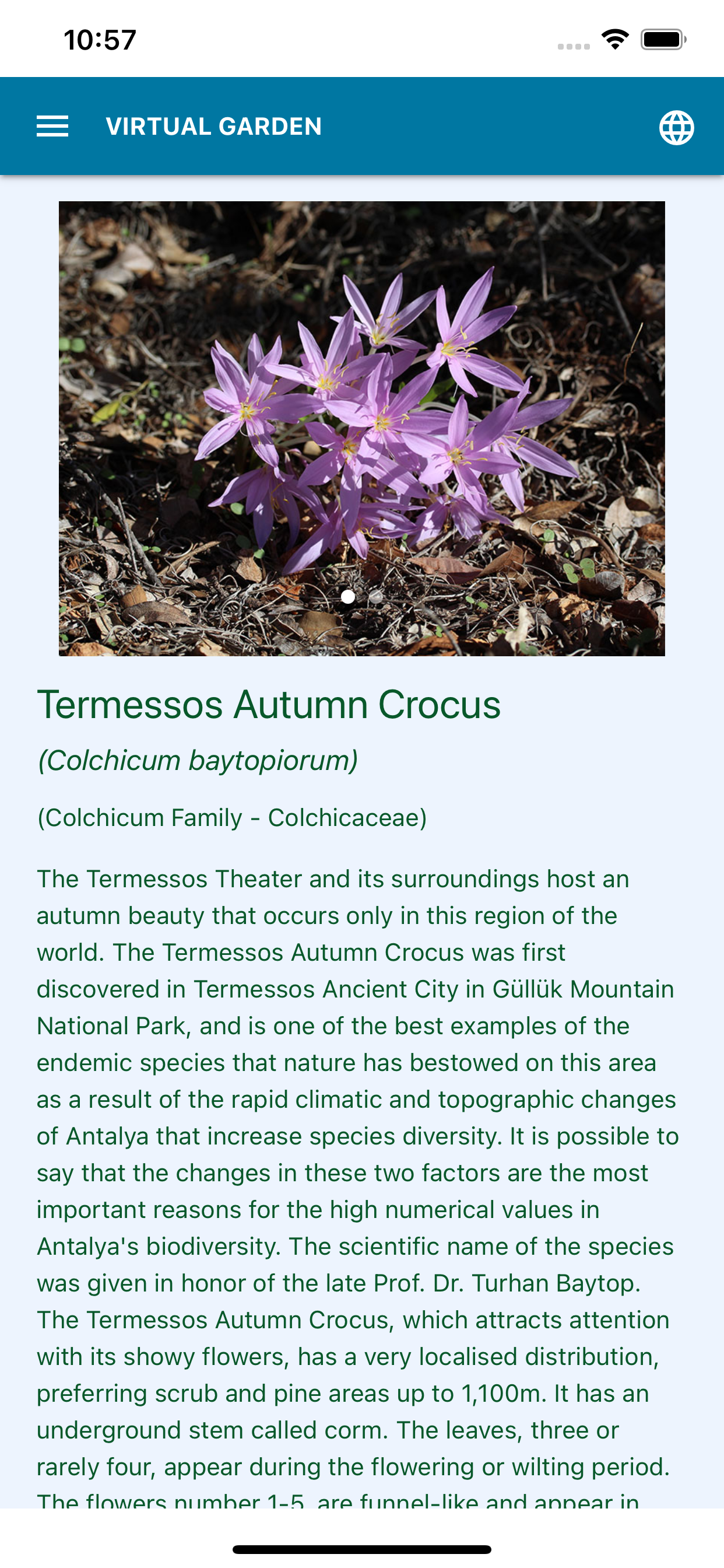










“Virtual Garden” is an application for mobile phones and smart devices that has been created in the scope of the project. Its main objective is to inform the visitors, tourist guides and the staff of the archaeological sites about the local flora, by providing relevant information and photos. The application includes the project implementation areas: the archaeological sites of Termessos, Aspendos, Perge, Phaselis and Side in Antalya, Tukrey and the archaeological sites of Acropolis, Sounion, Brauron and Marathon in Attica, Greece.

Τhis website has been created with the financial support of the European Union, within the framework of the European project “Ancient Cities for Endemic Flora, Apollo to Athena”, which is funded by the “Civil Society Dialogue between EU and Turkey – Grant Scheme V” (CSD-V) Programme. The project activities are based on best practice demonstration and pilot application regarding endemic and/or rare plants occurring in archaeological sites of both countries. They are structured around applied policies and methodologies for management of important plant species, and are addressed to various stakeholders involved in the management and conservation of archaeological sites. There are also awareness raising and dissemination activities that target the general public. The project is implemented by the Association for the Conservation of Antalya Orchids and Biodiversity (CAOB) and the Hellenic Society for the Protection of Nature (HSPN)
Association for the Conservation of Antalya Orchids and Biodiversity (CAOB), founded in 2010 in Antalya, Turkey, aims to protect primarily native orchids, biological diversity and natural resources, and to promote environmental awareness. The main task of the Association is flora and fauna research, including the continuity of the species generation. Its activities focus on critically endangered species, nature education and informative studies addressed to all stakeholders involved. For this purpose, CAOB develops projects and collaborations on research, education and cultural activities in national and international platforms with institutions active in environmental protection.
Founded in 1951, the Hellenic Society for the Protection of Nature (HSPN) is the oldest environmental organization in Greece. The HSPN represents in Greece the Foundation for Environmental Education (FEE), a global educational organization, and operates all five of its international Programmes for environmental education and sustainable management. At present, HSPN is active in five main areas: Environmental Interventions, Nature Conservation, Environmental Education, Sustainable Management in the Tourism Sector and Public Awareness Raising.
It is documented that archaeological sites host important, often rare and/or endemic, species of local flora, which often survive there because of the relative protection they offer. As intensified human activities and drastic land use changes affect the vegetation and flora, these isolated sites function as islands of naturalness, offering shelter to species that vanish from the surrounding areas.
Many endemic species have a limited distribution, often restricted to a small area, even to a single location. This means that they are very vulnerable to external pressures. The most important threat for plants, especially for narrow range species that depend on specific biotopes, is the destruction of their habitats. Specifically, endemic and/or rare plants that grow in archaeological sites are dependent on the interventions carried out in the site, and their conservation is dependent on the existing protection regime. At the same time, some archaeological sites are now attracting very large numbers of visitors, due to the rapid growth of tourism around the world. This exerts significant pressure on the flora they host.
The vegetation of archaeological sites contributes to their character and beauty and enhances their quality of authenticity. It is of great importance to retain these values with proper management. This can be a challenging task, since there are no official guidelines for vegetation management around archaeological sites. Nonetheless, due to the impacts of tourism, it is no longer sufficient to preserve only archaeological material. Management interventions should address the sites in connection with their natural surroundings, and encompass not only site-based planning but also local land-use planning. Such a concept should introduce function to the conservation process.




“A to A” consortium operates http://www.virtual-garden.org/ (the "Site"). This page informs you of our policies regarding the collection, use and disclosure of Personal Information we receive from users of the Site.
We use your Personal Information only for providing and improving the Site. By using the Site, you agree to the collection and use of information in accordance with this policy.
Information Collection And Use
While using our Site, we may ask you to provide us with certain personally identifiable information that can be used to contact or identify you. Personally identifiable information may include, but is not limited to your name ("Personal Information").
Personal Data Protection
Like many site operators, we collect information that your browser sends whenever you visit our Site ("Log Data").
This Log Data may include information such as your computer's Internet Protocol ("IP") address, browser type, browser version, the pages of our Site that you visit, the time and date of your visit, the time spent on those pages and other statistics.
We carefully treat all data collected as confidential and use it under the framework of “A to A” project activities in compliance with EU legal regulations and the Civil Society Programme.
All data collected and managed under the activities of the “A to A” project, namely accounts, public suscribers, event registrations, in is strict compliance with the new Regulation (EU) 2016/679, General Data Protection Regulation.
Cookies
Cookies are files with small amount of data, which may include an anonymous unique identifier. Cookies are sent to your browser from a web site and stored on your computer's hard drive.
Like many sites, we use "cookies" to collect information. You can instruct your browser to refuse all cookies or to indicate when a cookie is being sent. However, if you do not accept cookies, you may not be able to use some portions of our Site.
Security
The security of your Personal Information is important to us, but remember that no method of transmission over the Internet, or method of electronic storage, is 100% secure. While we strive to use commercially acceptable means to protect your Personal Information, we cannot guarantee its absolute security.
Changes To This Privacy Policy
This Privacy Policy is effective as of 19/4/2021 and will remain in effect except with respect to any changes in its provisions in the future, which will be in effect immediately after being posted on this page.
We reserve the right to update or change our Privacy Policy at any time and you should check this Privacy Policy periodically. Your continued use of the Service after we post any modifications to the Privacy Policy on this page will constitute your acknowledgment of the modifications and your consent to abide and be bound by the modified Privacy Policy.
If we make any material changes to this Privacy Policy, we will notify you either through the email address you have provided us, or by placing a prominent notice on our website.
Contact Us
If you have any questions about this Privacy Policy, please contact us.